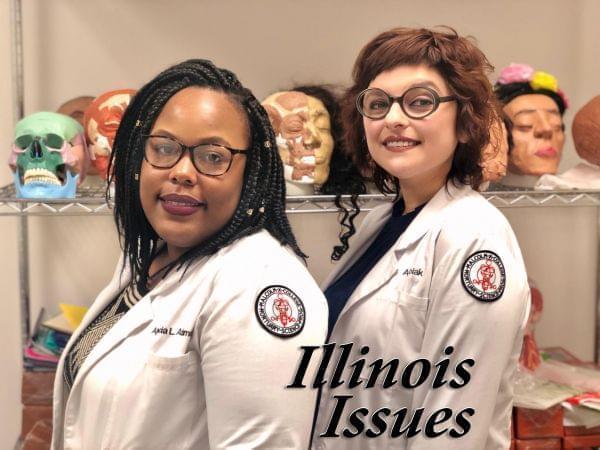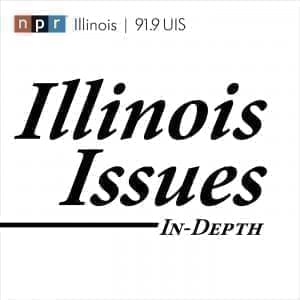Illinois Issues: Where The End Offers A New Beginning

Alycia Adams (left) and Anna Wolak, students in mortuary science, stand in the restorative arts lab, with a few practice skulls. Dusty Rhodes/NPR Illinois
College has traditionally been the place young adults get the education they need to pursue their life’s calling. At one of Chicago’s City Colleges, there’s a program for student’s whose life calling deals with death.
Alycia Adams attends Malcolm X College, which is strategically located near Chicago’s medical district, and specializes in the health sciences. But unlike most of her classmates at Malcolm X, Adams isn’t learning anything about saving lives.
“It started with a guinea pig, in third grade,” she says. “I had the responsibility of taking care of it over the summer, and they don’t live long, and so it died.”
With her mom headed out the door to work that day, Adams was left in charge of disposing of the guinea pig, which the class had named Mr. Squeaky.
“So I put him in a box, I decorated it, and like I said it was the summer, so I knew I had to get it out of the house,” she says.
Looking back, she wishes she had put the guinea pig in the refrigerator. But as a youngster who didn’t know any better, she opted to put the box in covered grill on the patio. Every day, she checked back, to make sure Mr. Squeaky hadn’t been discovered by a raccoon.
“So I literally watched every stage of death with that guinea pig,” Adams says. “And then the morbid curiosity afterwards led me to dead people.”
Adams is studying mortuary science at Malcolm X — one of only two community colleges in Illinois to offer such a degree (the other is Carl Sandburg College in Galesburg). It prepares students to work as a funeral director, manage a funeral home, embalm the dead, or — like many funeral service providers — do all three. Course requirements include accounting, anatomy, business law, embalming, ethics, funeral directing, merchandising, microbiology, psychology, restorative art, sociology, plus a capstone course to prepare for taking a board exam.
The school’s dress code hints at the profession’s different demands: Most days, students wear lab coats over dark-colored dress-up clothes. On Thursdays, they wear scrubs for restorative art lab, and add long johns and spatter-proof gear when they have embalming lab at the Cook County morgue.
Anna Wolak, another student, says it wasn’t always this way.
“The older generation — I’ve heard a lot of stories from people where it was like, ‘Oh yeah, my dad used to just go down to the basement and he’d just flip his tie over his shoulder and go to town!’ ”
Wolak moved to Chicago to attend art school, but got disillusioned and settled into the grind of creative day jobs in bookstores, coffee shops, record stores and restaurants. But in addition to her customer service gigs, one of her side hobbies was taxidermy.
“I’ve done a few mice, and a couple of rabbits,” she says. “They make really nice gifts, like if you taxidermy them and pose them for people.”
But she wasn’t especially interested in human specimen until a couple of years ago, when she made an emergency trip home to Pittsburgh. Her mother was providing hospice care for Wolak’s grandfather, who had dementia. His demise was hastened when he fell and hit his head. The night he died, a blizzard left the local roads impassable. Yet somehow, a pair of funeral directors made their way to the family home to collect her grandfather’s remains.
“It was like five o’clock in the morning,” Wolak says. “Everyone’s tired, everyone’s exhausted, and like, has been crying. And then these two incredibly dapper gentlemen show up, with beautifully pressed suits and bowler hats. And they were the sweetest, most considerate people, and took such gentle care of us.”
One tiny gesture stood out.
“My mom had passed out on the couch, because this was such a long ordeal for her, and one of the funeral directors picked up the afghan and, like, tucked her in,” Wolak says. “And that was such a moving moment to see how one little thing could give us so much comfort when it had been like this giant, long just exhausting ordeal.”
In that instant, Wolak knew what she wanted to do.
“The day that I came back, I opened up my computer and looked up ‘mortuary program Chicago,’ found Malcolm X, and applied.”

Karen Scott, mortuary science program director at Malcolm X College.
Karen Scott, a licensed funeral director for more than three decades, runs the program at Malcolm X, where more than 40 students are enrolled. She has a way of seeing what she calls “the scientific side” and the “event planning” side of the profession as just steps in the continuum of comfort.
“Actually, if you think about it, it’s a body. It’s what we all are housed in,” she says. “You know, and you just basically take them and take care of their body. Because what you’re doing is, you’re giving that family some type of comfort.
“I won’t say closure, because that happens somewhere down the road,” Scott says. “But you’re giving them some type of comfort.”
Of course, people outside the profession don’t necessarily see it that way. Wolak — who spends her evenings managing a restaurant — says she gets one of two reactions:
“So it’s really interested,” she says, “or just completely horrified that you’re doing this — and then serving them a drink.”
Adams’ after-school time is spent with her two children — Ty, age 7, and Victoria, age 4. She doesn’t tell them much about what she’s studying.
“My son, he’s the more curious one, he’s more aware. And so he’s the one who usually asks all the questions,” she says. “Victoria, she’ll get like secondhand information, but they only know, like, (mom) cares for dead people.”

Adams and Wolak are anomalies in the mortuary trade. Most funeral homes are family businesses, passed down from one generation to the next, so they aren’t sure they’ll get to work in their chosen profession. Just in case, Adams plans to get her bachelor’s at Southern Illinois University, with a minor in forensics, while Wolak is considering further studies in thanatology.
Links
- Illinois Issues: Vicious Cycle Emerges With Opioid And Suicide Epidemics
- Illinois Issues: The Pritzker Agenda
- Illinois Issues: New State Laws In 2019
- Illinois Issues: Piece Of The Pot - Money And Weed In Illinois
- Illinois Issues: When Walmart Leaves Town
- Illinois Issues: Ten Years Later, Has Illinois Learned The Right Lessons From Blagojevich?
- Illinois Issues: Illinois’ Birth - We Cooked The Books
- Illinois Issues: Gov. Rauner And The Folly Of Hubris
- Illinois Issues: Why Is Deerfield (Still) So White?
- Illinois Issues: Dear Governor-Elect Pritzker
- Illinois Issues: Third Parties - If Not Now, When?
- Illinois Issues: For Illinois Governors, Political Experience Optional

